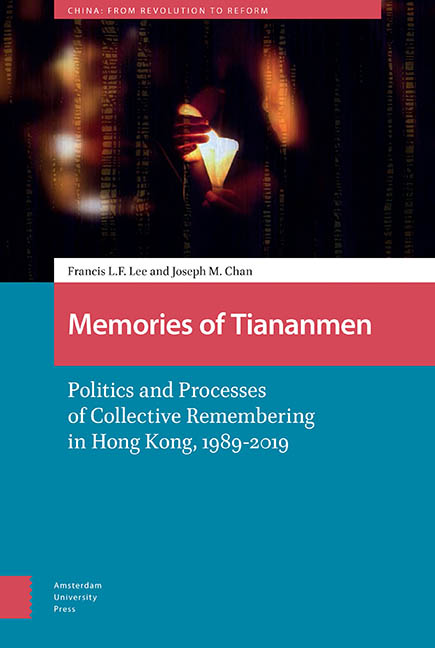Book contents
- Frontmatter
- Contents
- List of Figures and Tables
- Acknowledgments
- List of Abbreviations
- 1 Introduction
- 2 Memory Formation and the Valorization of Commemoration
- 3 Memory Mobilization
- 4 Intergenerational Memory Transmission
- 5 The Struggle for Memory Institutionalization
- 6 The Challenge of Localism and Memory Repair
- 7 Changing Attitudes toward Tiananmen?
- 8 Digital Media and Memory Balkanization
- 9 Conclusion
- Epilogue
- Appendix
- References
- Index
4 - Intergenerational Memory Transmission
Published online by Cambridge University Press: 16 July 2022
- Frontmatter
- Contents
- List of Figures and Tables
- Acknowledgments
- List of Abbreviations
- 1 Introduction
- 2 Memory Formation and the Valorization of Commemoration
- 3 Memory Mobilization
- 4 Intergenerational Memory Transmission
- 5 The Struggle for Memory Institutionalization
- 6 The Challenge of Localism and Memory Repair
- 7 Changing Attitudes toward Tiananmen?
- 8 Digital Media and Memory Balkanization
- 9 Conclusion
- Epilogue
- Appendix
- References
- Index
Summary
Abstract
Chapter 4 discusses the process of intergenerational memory transmission. It analyzes how young people in the 2000s and early 2010s took up knowledge and developed understandings of the events in 1989 through a web of institutions including the family, the school, and the media. Nevertheless, the limitation of intergenerational transmission in the period is also illustrated through comparing different generations’ attitudes and affects toward June 4. Moreover, in-depth interviews shed light on the challenge of intergenerational memory transmission within specific social institutions and professions.
Keywords: intergenerational memory transmission, generational differences, memories within organizations and institutions
When social organizations and civic groups in Hong Kong joined hands in 1989 to protest against the Chinese government during the Beijing student movement, they were following a long-established “coalition model” of social movement resource mobilization in the city. That is, when an important issue occurs, numerous social groups and associations would form an informal coalition to address the issue. Coalitions of this kind were often disbanded once the issue was resolved, or they might remain an informal alliance to facilitate continual work on the matter when needed. They rarely became formal organizations.
Against this background, the establishment of the Alliance in 1989 was an exception to the norm. As a veteran activist recalled, protest leaders at the time understood that promoting democratization in China is likely to be a long-term struggle. There were, in addition, concerns about the political risks involved in working on the topic. Movement leaders thus regarded a formal organization as necessary (Lee & Chan, 2011: 129).
As time went on, it became clear to the core members of the Alliance that collective remembering of Tiananmen cannot be sustained in the long run if memories about the event are not passed onto subsequent generations. If young people born in the late 1980s and afterward are not successfully recruited into the mnemonic community of Tiananmen, collective memory can quickly fade away once the original generation steps down. Therefore, the Alliance has deliberately emphasized the need to “pass on the baton” since the early 2000s. The Hong Kong Alliance Youth Group was formed in 2001. But even before that, since the 1990s, the annual vigils almost invariably included sessions for members of the Youth Group or representatives of university student unions to give speeches.
- Type
- Chapter
- Information
- Memories of TiananmenPolitics and Processes of Collective Remembering in Hong Kong, 1989–2019, pp. 123 - 154Publisher: Amsterdam University PressPrint publication year: 2021



